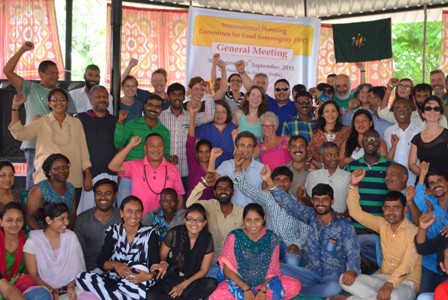Priorities of the International Planning Committee for Food Sovereignty (IPC)

The Habitat International Coalition’s Housing and Land Rights Network (HIC-HLRN) always has worked in cooperation with important and strategic partners to advance the discourse and economic, social and cultural rights, in general, and to advance collective work on housing and land rights, in particular. Through strategic engagement within the processes related to international food governance, HIC is contributing to the discussion on land rights and land-use policies, ensuring the realization of related rights in urban areas, including access to food and nutrition, markets and livelihoods, transparent public budgets and planning, interaction with local authorities and local policy engagement, and underpinning the indivisibility of human rights to housing and land, food, health and nutrition, amongst others.
One of HIC’s important alliances is with the International Planning Committee for Food Sovereignty (IPC), which is an autonomous and self-organized global platform of small-scale food producers and rural-worker organizations and grassroots/community-based social movements to advance the food sovereignty agenda at the global and regional levels.
From 28 August to 3 September 2015, the IPC global organizations and some regional focal points met for the general meeting, hosted by the MARAG Center, in GopNaad, Mera in Gujarat, India. That meeting was held to discuss the priorities of the organizations and movements, share current work and plan collective work and strategies over the next two years.
The IPC has several working groups that were formed to facilitate concrete work and interventions on priority issues. These groups include: land (and land + water), agroecology, seeds and biodiversity, livestock, fisheries, and access to markets (new this year). Over the past two years, HIC and HIC Members have been involved actively in various working groups and projects, including the implementation of the Voluntary Guidelines on the Responsible Governance of Tenure of Land, Fisheries and Forests Tenure Guidelines, via the land working group, and agroecology, specifically the role of local governments/authorities and public policies for agroecology. HIC also has been working actively toward building a MENA regional process for IPC, which included hosting the Land Forum V in Tunis.
The 2015 general meeting generated a strategic plan for the various working groups and established priority areas to be addressed within the structure of the IPC. This included tangible commitments to:
Launch a global day of action for Food Sovereignty on 16 October (World Food Day)
- Organize a global meeting of indigenous peoples in 2016
- Support a global conference on Land and Agrarian Reform to be held in Brazil in April 2016.
The meeting recognized Committee on World Food Security (CFS) as the central space in the UN system for food and agriculture policies and the UN Food and Agriculture Organization (FAO) as an important partner in the struggle for improved public policies for food and agriculture, and for the people working in the field. The meeting urged FAO to reinvigorate its role of providing full meaningful participation of civil society organizations and social movements at global, regional and national level and further reinforce their efforts to support and implement initiatives and public policies toward food sovereignty.
The organizations also denounced the false solutions that will be imposed at COP 21 UNFCCC, that will take place in Paris from 30 November to 11 December 2015. Organizations of IPC reject “climate-smart agriculture” and any other instrument of the “green economy” as solutions to the climate crisis, as well as any other attempt at strengthening agribusiness instead of agroecological models. The participants emphasized that governments must support agroecology within the framework of food sovereignty, the real solution to development amid the climate crisis.
At the same time, the organizations denounce the renewed attempts by the World Trade Organization (WTO) to prevent states from passing policies and public procurement to eradicate hunger and poverty. The WTO is an organisation that imposes free trade regulations to concentrate more wealth in the hands of just a few “developed” countries and transnational corporations. They reiterated that the WTO’s legitimacy is diminishing further by trying to resurface through the Bali Package, which threatens food sovereignty and the future of peoples and of the planet.
HIC will continue to interface with the IPC over the next years to pursue common strategic priorities, to promote peoples’ solutions and operationalize economic, social and cultural human rights.
For more information an HICs work with IPC, please email us at hlrn@hlrn.org.
The full press release from the general meeting can be found here
|